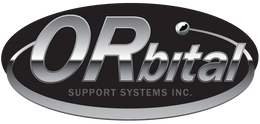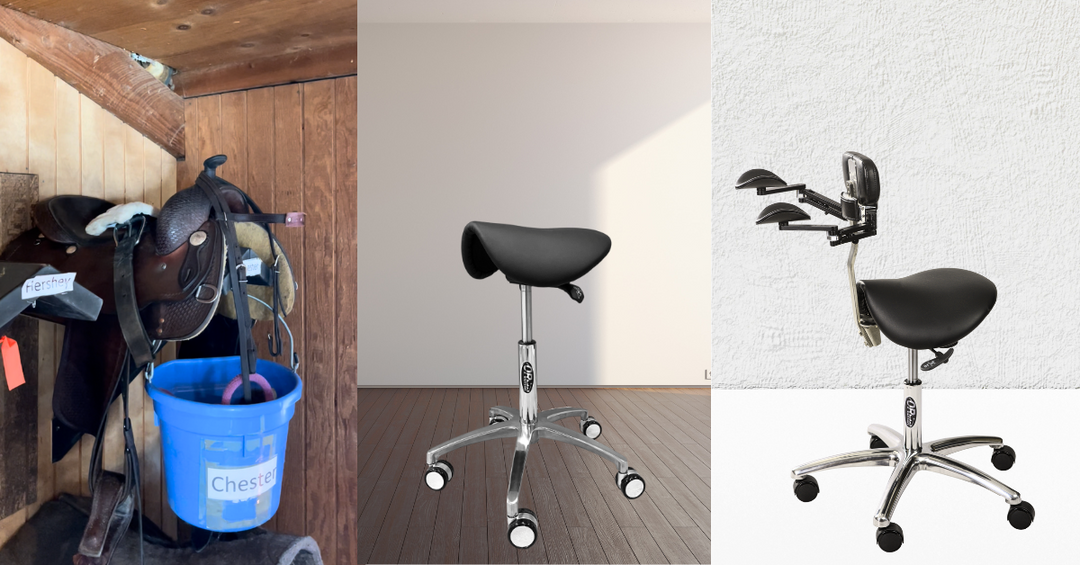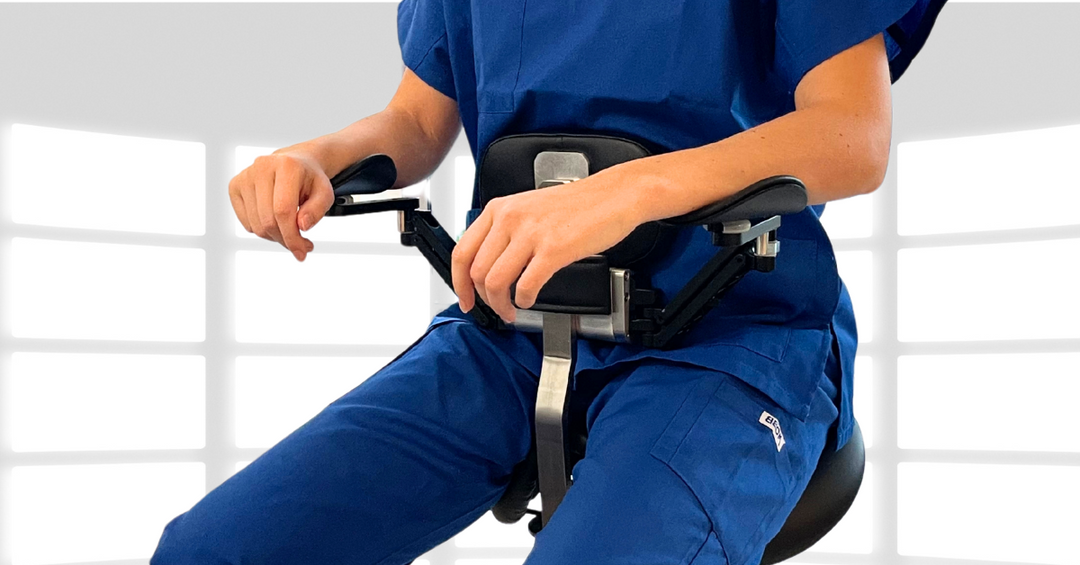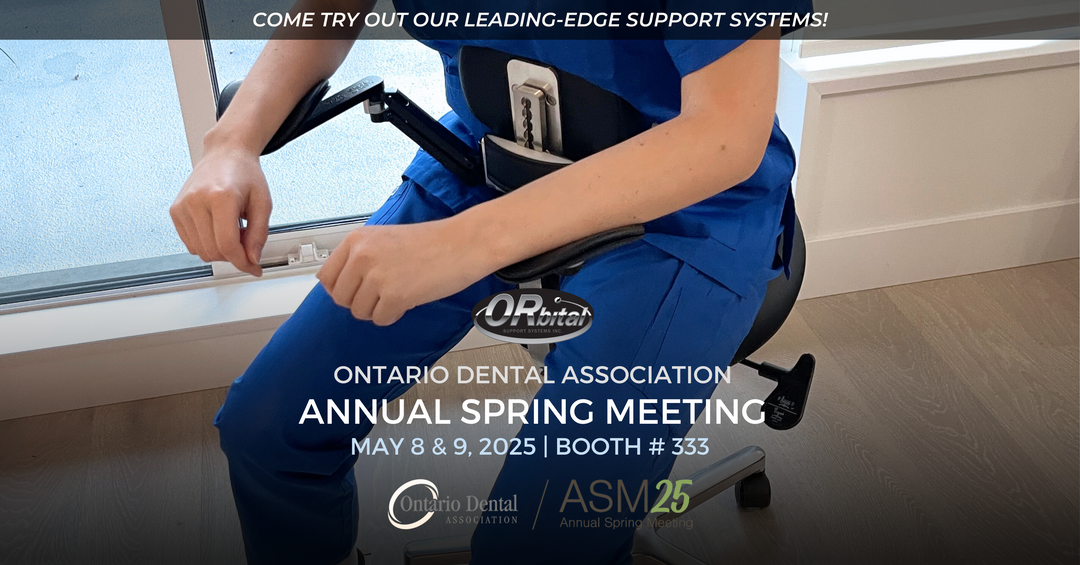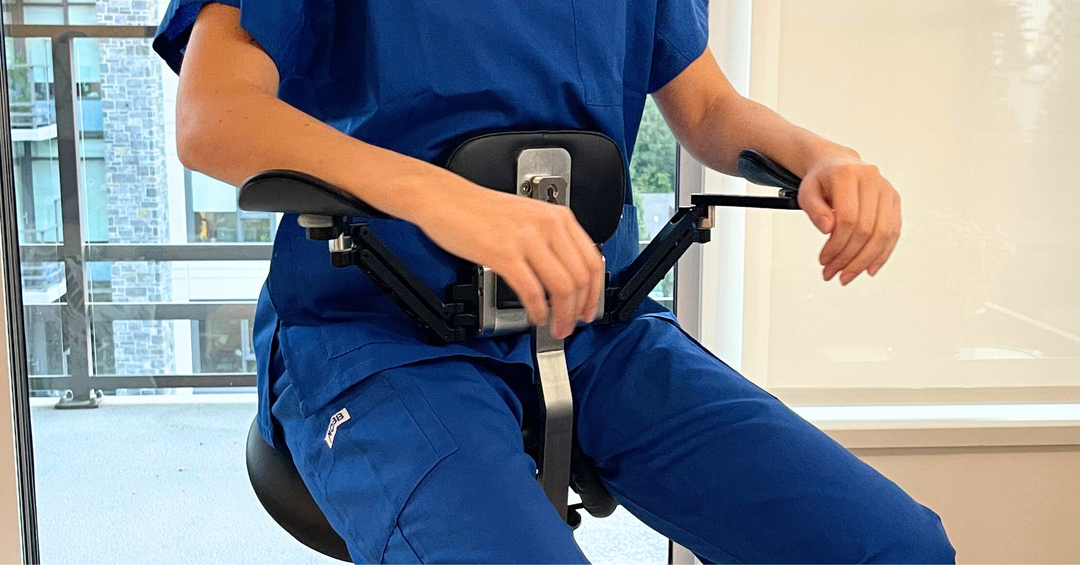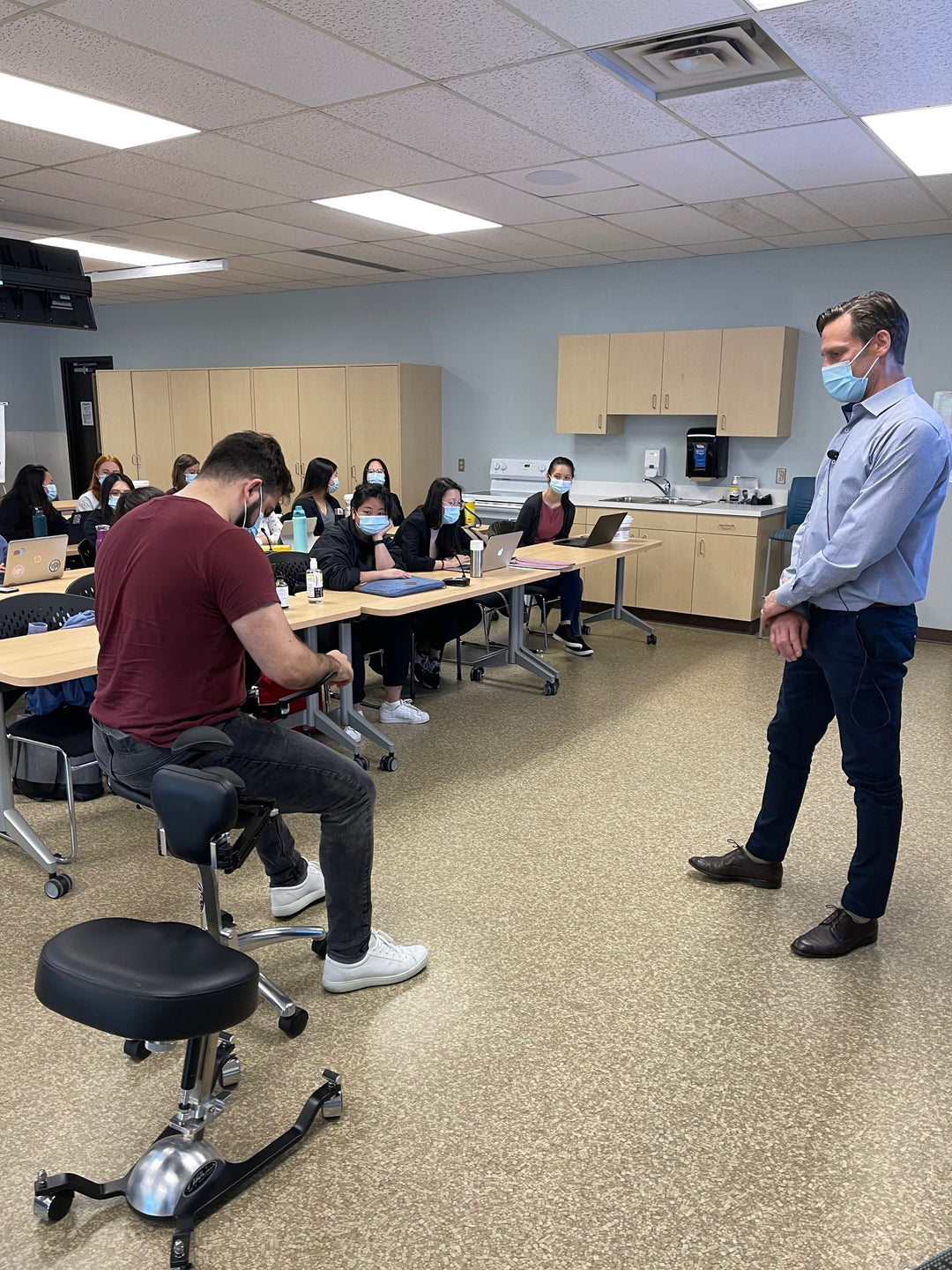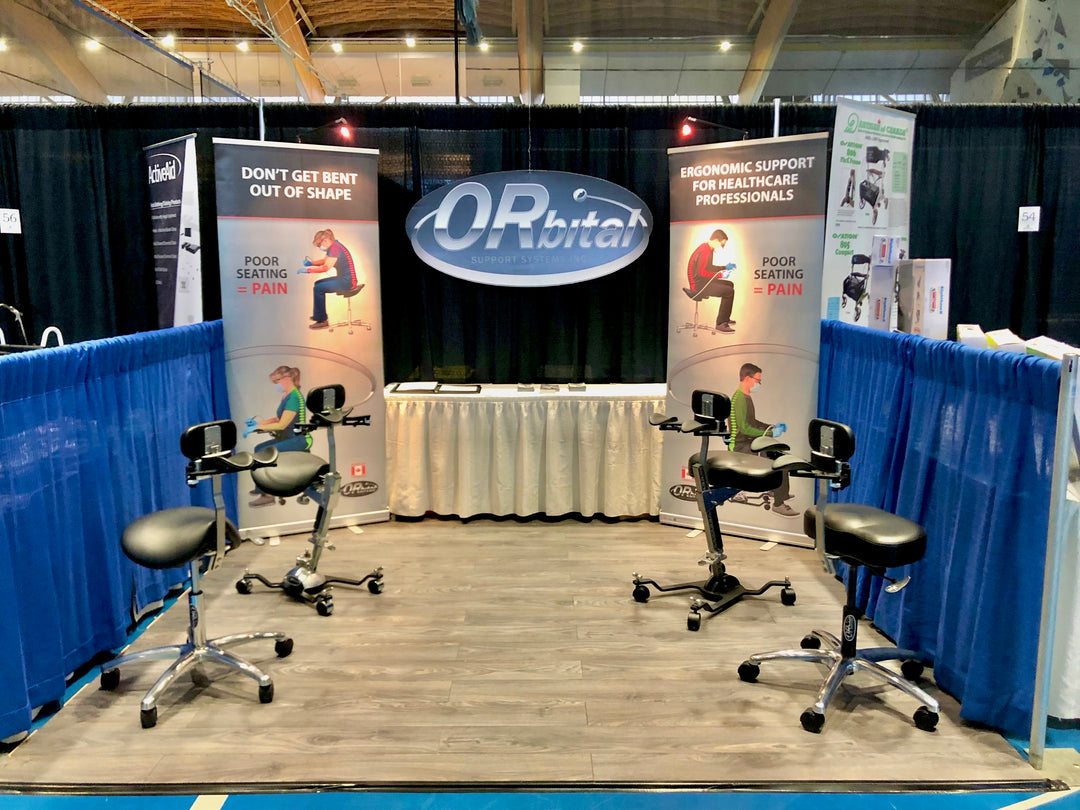Say Goodbye to Back Pain: Why Chest Support is Your 2025 Essential
New Year, New Chair!
Time do make some changes? Body aches and pain?
Let’s give up that unused backrest and evolve to a chest pad.
Backrests go largely unused and anterior support is clinically proven to provide much better support in most healthcare settings.
The Advantages of Orbital Ergonomic Chairs / Stools with Anterior Support
In healthcare settings, professionals like doctors, nurses, surgeons, and dental practitioners often spend long hours seated or in a fixed position while attending to patients. Choosing the right seating is crucial for maintaining comfort, avoiding fatigue, and promoting good posture throughout these demanding shifts. Traditional chairs with backrests have been the go-to seating option for many years, offering support to the lower back. However, Orbital ergonomic chairs and stools with anterior support are emerging as a superior choice for healthcare professionals, offering numerous advantages in comparison to conventional chairs with backrests.
Understanding Anterior Support
Orbital ergonomic chairs or stools are a modern seating solution designed to provide dynamic support and flexibility. Unlike traditional fixed chairs, orbital chairs allow for a more active sitting experience by facilitating movement—such as tilting or rotating—while still offering the stability necessary for maintaining posture. The anterior support in these chairs and stools offers support to the front of the body by way of an adjustable chest pad, providing a balance of comfort, support and stability in forward leaning work environments.
- Encourages Active Posture and Reduces Slouching
Traditional chairs with backrests often encourage passive sitting, which can lead to slouching or poor posture over time. In healthcare environments, this can contribute to musculoskeletal problems such as back pain, neck strain, and discomfort in the lower limbs, especially for professionals who spend hours seated or in fixed positions.
Orbital ergonomic chairs with anterior support promote active posture, requiring the engagement of core muscles to maintain balance and stability. This support helps align the spine properly, encouraging a more neutral posture that reduces the likelihood of slouching. By distributing the body’s weight evenly, these chairs allow healthcare professionals to maintain a more comfortable and supportive position for longer periods, thus preventing the fatigue associated with passive sitting.
- Reduces Pressure on the Lower Back, Hips, and Thighs
Sitting in a traditional chair with a backrest can sometimes place undue pressure on the lower back, hips, and thighs, particularly if the chair’s seat design is poor or if the professional is sitting for extended periods. The anterior support in orbital ergonomic chairs redistributes weight, reducing the pressure on sensitive areas of the body.
For healthcare workers who often spend long hours sitting, such as dental professionals or medical staff in surgeries, reducing this pressure is essential for preventing discomfort and the development of chronic conditions like sciatica or muscle fatigue. The anterior support helps balance the body’s weight across the thighs and pelvis, allowing for more comfort while seated. As a result, healthcare professionals are less likely to experience numbness or stiffness in the hips and legs, which is a common issue with traditional seating.
- Promotes Core Strength and Stability
Orbital ergonomic chairs with anterior support require users to engage their core muscles to maintain balance and stability. This continuous engagement of core muscles strengthens the abdominal and lower back muscles, which are essential for overall postural health.
In healthcare settings, a strong core is critical for maintaining good posture and preventing injuries, especially for workers who must shift from sitting to standing, or bend and reach during procedures. By strengthening the core muscles, orbital ergonomic chairs reduce the risk of developing musculoskeletal issues like lower back pain or neck strain, which can arise from prolonged poor posture.
- Improved Focus and Productivity
Prolonged sitting in a chair that doesn’t offer proper support can lead to discomfort, distractions, and fatigue—factors that negatively impact focus and productivity. In a healthcare setting, where attention to detail and concentration is essential for patient safety, comfort is key.
Orbital ergonomic chairs with anterior support allow for a more dynamic and comfortable sitting experience. By maintaining proper alignment and relieving pressure from the back and thighs, these chairs enable healthcare professionals to focus on their tasks without being distracted by discomfort. Whether performing a dental procedure, administering patient care, or completing administrative tasks, these ergonomic chairs contribute to a healthier and more productive workday.
- Adaptable for Different Tasks and Patients
In healthcare settings, the same chair or stool may need to be used for multiple tasks or patients. For example, in a dental office, the same chair might be used for different patients of varying heights and sizes. Orbital ergonomic chairs offer adjustability in height, tilt, and support, making them suitable for different tasks and users. Whether a dental professional is performing a detailed procedure or a nurse is providing patient care, the ability to adjust the chair ensures comfort and support for different scenarios.
The anterior support in these chairs helps to provide a comfortable experience for the practitioner while adapting to the patient who may be positioned at different angles, while being treated.
- Stylish and Space-Saving Design
In healthcare environments, particularly in dentist offices, examination rooms, or operating rooms, space efficiency is a key consideration. Orbital ergonomic chairs with anterior support typically have a sleek, compact design that takes up less space compared to traditional bulky chairs with backrests. These modern, ergonomic designs also have an aesthetic appeal, helping to create a more pleasant and professional environment for both healthcare professionals and patients.
Their design not only makes them ideal for tight spaces, but it also ensures that they complement the modern, high-tech appearance of healthcare facilities.
Conclusion
While traditional chairs with backrests have long been the standard in healthcare settings, Orbital ergonomic chairs and stools with anterior support provide significant advantages for healthcare professionals. From improving posture and mobility to reducing pressure on the body and promoting core strength, these chairs offer a more dynamic and supportive seating option.
For dental professionals, surgeons, and other healthcare workers, these ergonomic chairs can enhance comfort, focus, and productivity, ultimately benefiting both the practitioner and their patients. In an environment where long hours and demanding tasks are the norm, investing in seating that actively supports the body is a game changer for improving both the health and efficiency of healthcare workers.
View the full range of Orbital Ergonomic Chairs: https://orbitalsupportsystems.com/
